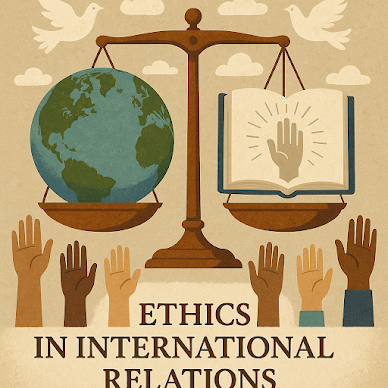In the modern global landscape, the role of ethics in international relations is more important than ever. Ethics provides a framework of moral values and principles that help guide the actions of nations in their dealings with one another. Without these values, international affairs would be dominated by power politics, selfish interests, and exploitation.
1.
Understanding Ethics in Global Politics
What
is Ethics?
Ethics refers to the moral principles that define what is right and wrong.
In international relations, these principles help guide how countries behave
toward each other, balancing national interests with global responsibilities.
Why
Ethics Matter in International Relations
Ethical standards help ensure that global interactions are fair, respectful,
and just. They remind powerful nations to act responsibly and weaker nations to
stand firm on shared values.
2.
Ethical Responsibility in Foreign Policy
Acting
Beyond National Interests
Countries often prioritize their own safety and economic strength. However,
ethical foreign policy considers how decisions affect other nations and global
stability.
Examples
of Ethical Responsibility
When nations offer humanitarian aid, welcome refugees, or support
peacekeeping missions, they show a commitment to ethical values that go beyond
borders.
3.
Human Rights as a Core Ethical Value
Global
Commitment to Human Rights
Ethics demands that countries respect the dignity and rights of all people.
International agreements, such as the Universal Declaration of Human Rights,
reflect this global moral standard.
International
Responses to Violations
When human rights are violated — through war crimes, torture, or repression
— ethical international relations require other nations to speak out and take
action, whether through diplomacy, sanctions, or support for justice.
4.
Ethics in Diplomacy and Negotiation
The
Importance of Trust and Honesty
Diplomatic relations depend on ethical behavior such as honesty, transparency,
and mutual respect. Nations that lie or break treaties lose credibility on the
world stage.
Peaceful
Conflict Resolution
Ethical diplomacy promotes dialogue over war, focusing on win-win solutions
rather than domination or aggression.
5.
Ethics and Global Challenges
Shared
Responsibility
Issues like climate change, pandemics, poverty, and migration require global
cooperation. Ethics reminds nations that solving these problems is a shared
moral duty.
Support
for Developing Nations
Wealthier countries have an ethical obligation to assist poorer ones,
ensuring fairness and justice in global development.
6.
Challenges in Applying Ethics
Balancing
Morality and National Interest
Sometimes, ethical actions may seem to conflict with a country’s economic or
security needs. In such situations, ethical decision-making becomes complex and
requires thoughtful analysis.
Dealing
with Double Standards
A major challenge in ethical international relations is when powerful
nations apply ethics selectively — criticizing others but ignoring their own
violations. True ethical leadership means holding all countries, including
one’s own, to the same standards.
Conclusion
Ethics in international relations provides a moral compass for nations
navigating global issues. It promotes justice, peace, cooperation, and respect
for human dignity. Though applying ethical principles is not always easy, they
are essential for building a stable, peaceful, and fair world. In the long run,
ethics not only guide individual actions but also shape the global future we
all share.
Fragility of Economic Stability












